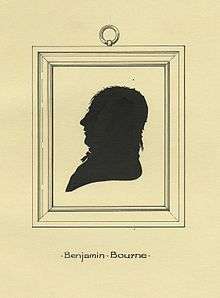Benjamin Bourne
| Benjamin Bourne | |
|---|---|
 | |
| Judge of the United States Circuit Court for the First Circuit | |
|
In office February 20, 1801 – July 1, 1802 | |
| Appointed by | John Adams |
| Preceded by | Seat established |
| Succeeded by | Seat abolished |
| Judge of the United States District Court for the District of Rhode Island | |
|
In office October 13, 1796 – February 20, 1801 | |
| Appointed by | George Washington |
| Preceded by | Henry Marchant |
| Succeeded by | David Barnes |
| Member of the U.S. House of Representatives from Rhode Island's At-large district | |
|
In office August 31, 1790 – October 13, 1796 | |
| Preceded by | Constituency established |
| Succeeded by | Elisha Potter |
| Member of the Rhode Island General Assembly | |
|
In office 1789–1790 | |
| Personal details | |
| Born |
August 9, 1755 Bristol, Rhode Island, British America |
| Died |
August 17, 1808 (aged 53) Bristol, Rhode Island, U.S. |
| Political party | Federalist |
| Alma mater | Harvard University |
Benjamin Bourne (September 9, 1755 – September 17, 1808) was an American jurist and politician from Bristol, Rhode Island. He represented Rhode Island in the U.S. House of Representatives and served as a judge in both the federal district and federal appellate courts.
Borurne was born in Bristol and graduated from Harvard College in 1775. He read law to enter the Bar and began practice in Providence. During the Revolutionary War, he served as ensign, then quartermaster of the 2nd Rhode Island Regiment in 1776.
After the war, Bourne began his political life as a member of the Rhode Island general assembly in 1789 and 1790. In 1799, Bourne was appointed to a committee to revise the state's militia laws. From 1783 to 1784, Bourne collected excise tax for Providence County. Then, between 1785 and 1789, he served as Justice of the Peace in Providence County. Bourne served on the federalist (pro-Constitution) committee which negotiated an end to William West's armed anti-federalist (Country Party) protest on July 4, 1788. In 1789, with the Reverend James Manning, Bourne petitioned Congress regarding relief from import duties imposed upon Rhode Island as a foreign nation.
After Rhode Island ratified the Constitution, Bourne was elected as Pro-Administration to the First through Third Congresses and as a Federalist to the Fourth and Fifth Congresses. He resigned before the fifth Congress began, however.
Upon returning to Rhode Island, Bourne received a recess appointment from President George Washington on October 13, 1796, to a seat on the United States District Court for the District of Rhode Island vacated by Henry Marchant. Bourne was formally nominated on December 21, 1796, and was confirmed by the United States Senate, and received his commission, the following day. On February 18, 1801, Bourne was nominated by President John Adams to a new seat on the United States Circuit Court for the First Circuit created by 2 Stat. 89. He was confirmed by the Senate, and received his commission, on February 20, 1801. Bourne's judicial service ended on July 1, 1802, due to abolition of the Circuit court.
Bourne died in Bristol, and is buried in the Juniper Hill Cemetery there.
External links
- Benjamin Bourne Papers, Rhode Island Historical Society
- United States Congress. "Benjamin Bourne (id: B000669)". Biographical Directory of the United States Congress.
- Benjamin Bourne at the Biographical Directory of Federal Judges, a public domain publication of the Federal Judicial Center.

| United States House of Representatives | ||
|---|---|---|
| New constituency | Member of the U.S. House of Representatives from Rhode Island's At-large congressional district 1790–1796 |
Succeeded by Elisha Potter |
| Legal offices | ||
| Preceded by Henry Marchant |
Judge of the United States District Court for the District of Rhode Island 1796–1778 |
Succeeded by David Barnes |
| New seat | Judge of the United States Circuit Court for the First Circuit 1801–1802 |
Seat abolished |